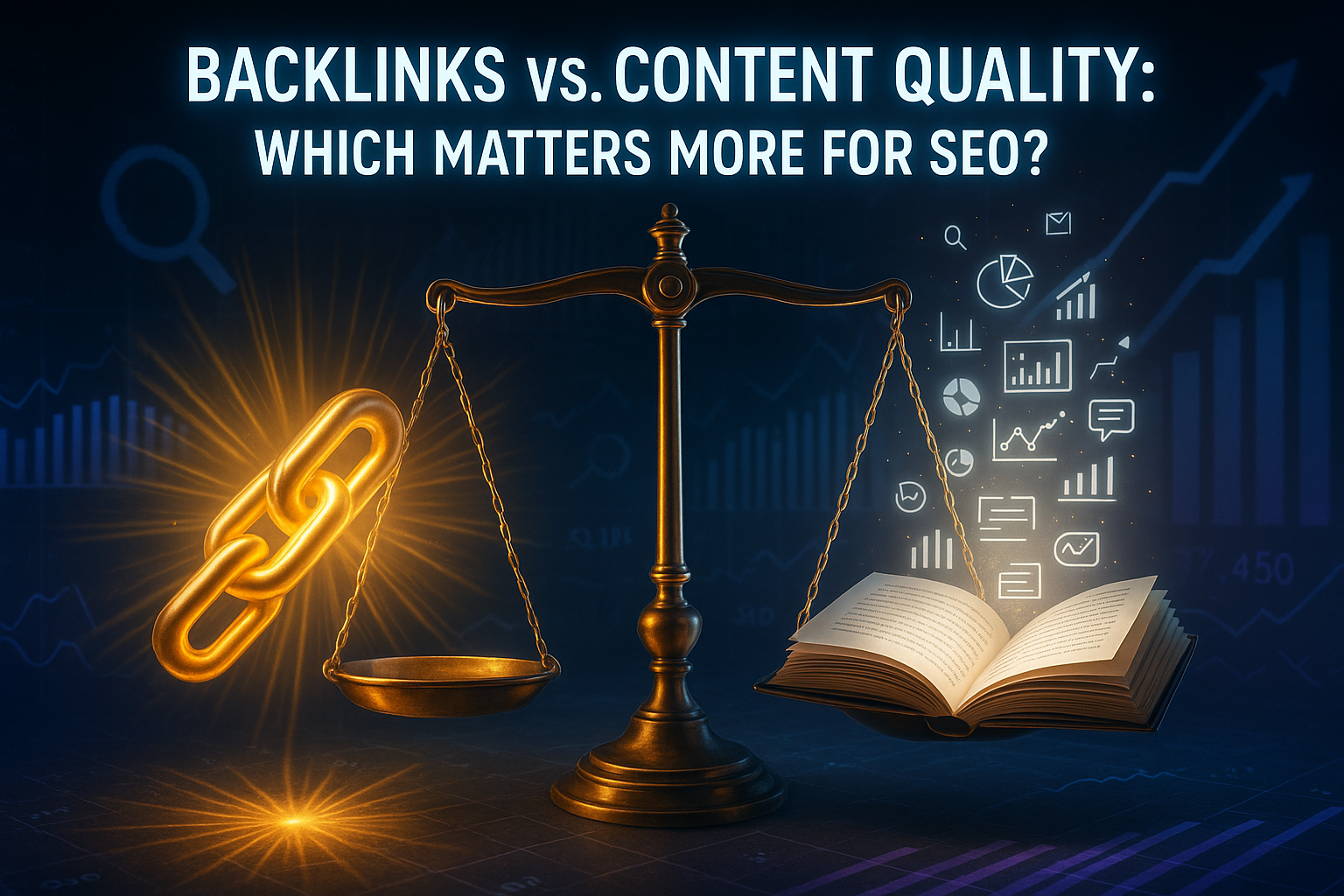Search engine optimization (SEO) has always been a blend of art and science. While Google’s algorithm continues to evolve, two pillars remain critical for ranking success: backlinks and content quality. For years, digital marketers have debated which of the two holds more weight. In truth, both are essential—but their role, influence, and long-term impact differ significantly.
In this article, we will break down the true value of backlinks and content quality, explore their relationship, and uncover which element matters more for sustainable SEO growth.
Understanding the Role of Backlinks in SEO
Backlinks—also known as inbound links—are hyperlinks pointing from one website to another. Search engines view these as “votes of confidence”, signaling that a website is trustworthy and authoritative.
Why Backlinks Are Crucial
- Authority & Trust: Websites with high-quality backlinks often outrank competitors because search engines associate them with credibility.
- Traffic Diversion: Backlinks from high-traffic sites can drive referral traffic directly to your pages.
Faster Indexing: Search engine bots follow backlinks, helping them discover and index your new content quickly.
The Importance of Link Quality Over Quantity
In the early days of SEO, acquiring as many backlinks as possible was enough. Today, however, link quality far outweighs sheer numbers. A single backlink from a reputable authority site can be more powerful than dozens of low-quality links.
Google’s algorithms, including Penguin, specifically target link spam. This means backlinks must come from relevant, authoritative, and trustworthy domains to provide real SEO value.
Content Quality: The Foundation of Modern SEO
If backlinks act as votes, content quality is the candidate that earns those votes. Without strong, engaging content, backlinks are harder to acquire and nearly impossible to sustain.
What Defines High-Quality Content?
- Relevance: Content should directly answer the searcher’s intent.
- Depth: Comprehensive, detailed information that covers every aspect of the topic.
- Readability: Easy-to-understand writing style with proper formatting, headings, and flow.
- Originality: Unique insights, not copied or rehashed material.
Optimization: Natural keyword usage, engaging titles, and strategic internal linking.
Why Google Prioritizes Content Quality
With updates like RankBrain and Helpful Content Update, Google now places significant emphasis on user experience and engagement. Metrics such as dwell time, bounce rate, and click-through rate are influenced directly by content quality.
Simply put, backlinks may bring users in, but content quality keeps them engaged and satisfied.
Backlinks vs. Content Quality: Which Has More Weight?
Both factors play essential roles, but their weight varies depending on the SEO context.
Short-Term vs. Long-Term Impact
- Backlinks can deliver faster visibility by signaling authority quickly.
- Content quality ensures long-term ranking stability by consistently providing value to readers.
Link Building Without Quality Content Fails
If your site has hundreds of backlinks but weak content, users will leave quickly, signaling to Google that the page doesn’t satisfy intent. This leads to drops in ranking.
Quality Content Attracts Organic Backlinks
The best way to earn natural, sustainable backlinks is by publishing exceptional content that others want to cite. High-value articles, research studies, guides, and case studies naturally generate inbound links.
Case Study: How Content Outshines Backlinks in Some Niches
Let’s consider two websites targeting the same keyword:
- Site A: Has 200 backlinks from average websites, but thin, low-value content.
- Site B: Has only 20 backlinks but offers an in-depth, well-structured, and updated article.
Over time, Site B is more likely to outrank Site A because search engines prioritize relevance, engagement, and user satisfaction. This demonstrates that while backlinks accelerate visibility, content quality ensures dominance.
Striking the Right Balance: Backlinks + Content Quality
The truth is, backlinks and content quality are not enemies—they are partners. The most successful SEO strategies integrate both.
How to Build This Balance
- Start With Quality Content: Create authoritative, SEO-optimized content that addresses search intent comprehensively.
- Promote Content for Backlinks: Reach out to industry blogs, influencers, and journalists to gain citations and mentions.
- Leverage Internal Linking: Strengthen your site’s architecture by interlinking related articles.
- Update Regularly: Keep content fresh and relevant to maintain rankings and continue earning backlinks.
Avoid Black-Hat Tactics: Stay away from link farms, paid links, and keyword stuffing. Google penalties can destroy long-term progress.
Future of SEO: Content-Centric With Backlink Support
As Google’s AI-driven algorithms evolve, content will increasingly become the primary ranking factor. While backlinks will remain relevant, their influence may diminish compared to user satisfaction signals.
Search engines are becoming more adept at understanding semantic context, topical authority, and content quality without solely relying on backlinks.
Conclusion: The Real Winner Between Backlinks and Content Quality
In the debate of backlinks vs. content quality, the answer is clear: content quality forms the foundation, while backlinks act as amplifiers. You cannot build sustainable SEO success without exceptional content, and backlinks serve best when they reinforce already valuable material.
For businesses aiming to dominate search rankings, the best approach is to invest in creating authoritative content first, then actively pursue high-quality backlinks. This dual strategy ensures both immediate authority and long-term SEO stability.






